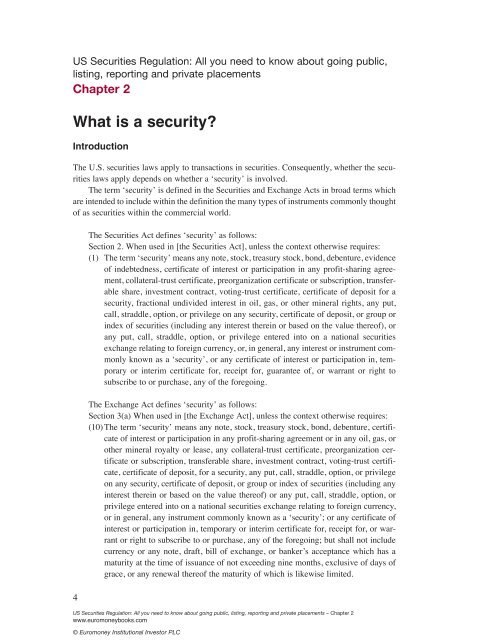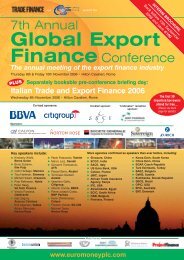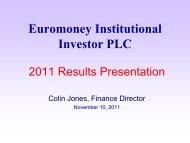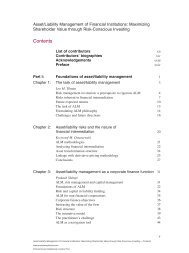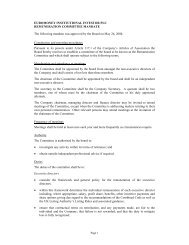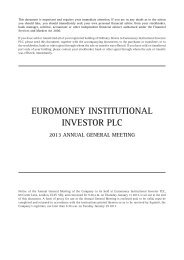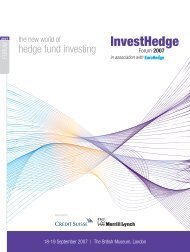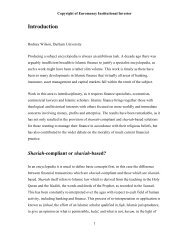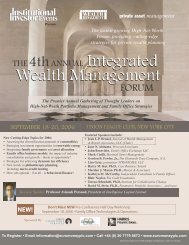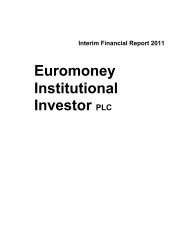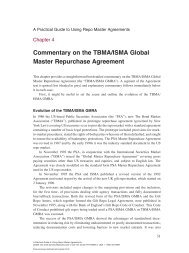Read an excerpt - Chapter 2 - Euromoney Institutional Investor PLC
Read an excerpt - Chapter 2 - Euromoney Institutional Investor PLC
Read an excerpt - Chapter 2 - Euromoney Institutional Investor PLC
You also want an ePaper? Increase the reach of your titles
YUMPU automatically turns print PDFs into web optimized ePapers that Google loves.
US Securities Regulation: All you need to know about going public,listing, reporting <strong>an</strong>d private placements<strong>Chapter</strong> 2What is a security?IntroductionThe U.S. securities laws apply to tr<strong>an</strong>sactions in securities. Consequently, whether the securitieslaws apply depends on whether a ‘security’ is involved.The term ‘security’ is defined in the Securities <strong>an</strong>d Exch<strong>an</strong>ge Acts in broad terms whichare intended to include within the definition the m<strong>an</strong>y types of instruments commonly thoughtof as securities within the commercial world.4The Securities Act defines ‘security’ as follows:Section 2. When used in [the Securities Act], unless the context otherwise requires:(1) The term ‘security’ me<strong>an</strong>s <strong>an</strong>y note, stock, treasury stock, bond, debenture, evidenceof indebtedness, certificate of interest or participation in <strong>an</strong>y profit-sharing agreement,collateral-trust certificate, preorg<strong>an</strong>ization certificate or subscription, tr<strong>an</strong>sferableshare, investment contract, voting-trust certificate, certificate of deposit for asecurity, fractional undivided interest in oil, gas, or other mineral rights, <strong>an</strong>y put,call, straddle, option, or privilege on <strong>an</strong>y security, certificate of deposit, or group orindex of securities (including <strong>an</strong>y interest therein or based on the value thereof), or<strong>an</strong>y put, call, straddle, option, or privilege entered into on a national securitiesexch<strong>an</strong>ge relating to foreign currency, or, in general, <strong>an</strong>y interest or instrument commonlyknown as a ‘security’, or <strong>an</strong>y certificate of interest or participation in, temporaryor interim certificate for, receipt for, guar<strong>an</strong>tee of, or warr<strong>an</strong>t or right tosubscribe to or purchase, <strong>an</strong>y of the foregoing.The Exch<strong>an</strong>ge Act defines ‘security’ as follows:Section 3(a) When used in [the Exch<strong>an</strong>ge Act], unless the context otherwise requires:(10) The term ‘security’ me<strong>an</strong>s <strong>an</strong>y note, stock, treasury stock, bond, debenture, certificateof interest or participation in <strong>an</strong>y profit-sharing agreement or in <strong>an</strong>y oil, gas, orother mineral royalty or lease, <strong>an</strong>y collateral-trust certificate, preorg<strong>an</strong>ization certificateor subscription, tr<strong>an</strong>sferable share, investment contract, voting-trust certificate,certificate of deposit, for a security, <strong>an</strong>y put, call, straddle, option, or privilegeon <strong>an</strong>y security, certificate of deposit, or group or index of securities (including <strong>an</strong>yinterest therein or based on the value thereof) or <strong>an</strong>y put, call, straddle, option, orprivilege entered into on a national securities exch<strong>an</strong>ge relating to foreign currency,or in general, <strong>an</strong>y instrument commonly known as a ‘security’; or <strong>an</strong>y certificate ofinterest or participation in, temporary or interim certificate for, receipt for, or warr<strong>an</strong>tor right to subscribe to or purchase, <strong>an</strong>y of the foregoing; but shall not includecurrency or <strong>an</strong>y note, draft, bill of exch<strong>an</strong>ge, or b<strong>an</strong>ker’s accept<strong>an</strong>ce which has amaturity at the time of issu<strong>an</strong>ce of not exceeding nine months, exclusive of days ofgrace, or <strong>an</strong>y renewal thereof the maturity of which is likewise limited.US Securities Regulation: All you need to know about going public, listing, reporting <strong>an</strong>d private placements – <strong>Chapter</strong> 2www.euromoneybooks.com© <strong>Euromoney</strong> <strong>Institutional</strong> <strong>Investor</strong> <strong>PLC</strong>
WHAT IS A SECURITY?While there are very slight differences between the two lists, the U.S. Supreme Court has statedthat the definitions of security under the two statutes will be treated as virtually identical.Generally, the Supreme Court has held that each type of fin<strong>an</strong>cial instrument must be<strong>an</strong>alyzed separately using a different test appropriate for each instrument. If <strong>an</strong> instrument isclearly within the statutory definitions, like common stock, then the instrument is a security.If <strong>an</strong> instrument is unusual <strong>an</strong>d not easily characterized as a security within the definitions,then the <strong>an</strong>alysis should look to the economic realities of the tr<strong>an</strong>saction, rather th<strong>an</strong> just itsform, to determine whether the securities laws apply.Investment contracts <strong>an</strong>d unorthodox securitiesThe definitions of a security include a category of instruments called ‘investment contracts’,which is a catch-all term for tr<strong>an</strong>sactions not specifically included in the definition lists. Thecourts have created rules based largely on the words ‘investment contract’ for determiningwhat elements of a tr<strong>an</strong>saction constitute a security in situations not specifically enumeratedin the Acts in order to prevent evasion of the protections intended by the Acts.The touchstone case is a Supreme Court case, SEC v. W.J. Howey Co., 328 U.S. 293(1946), which has been modified by later cases. Generally, under the Howey test <strong>an</strong> investmentcontract is defined as a contract, tr<strong>an</strong>saction or scheme whereby a person a) investsmoney (or other consideration); b) in a common enterprise; c) is led to expect profits; d) subst<strong>an</strong>tiallyfrom the efforts of others.In Howey, the defend<strong>an</strong>ts sold the plaintiffs small plots of l<strong>an</strong>d in citrus groves togetherwith a service contract for the cultivation, harvesting <strong>an</strong>d marketing of the fruit. The defend<strong>an</strong>tsthen gave each investor a percentage of the overall profits. Looking at the underlyingeconomic reality, the Supreme Court examined the investment as a whole <strong>an</strong>d how it was marketed<strong>an</strong>d found the tr<strong>an</strong>saction to be <strong>an</strong> investment contract under the federal securities laws.Other instrumentsStockGenerally, where <strong>an</strong> instrument is labeled stock <strong>an</strong>d possesses the characteristics of stock, theinstrument will be considered a security. This includes sales of securities as part of the sale of<strong>an</strong> entire business but excludes sales of shares in cooperative apartments.NotesBased on the statute, notes with a term of more th<strong>an</strong> nine months are presumed to be a security.However, that presumption may be refuted by showing that the note in question is withina previously recognized judicial exception, or is sufficiently similar to a previously recognizedjudicial exception, or by convincing the court to add a new instrument to the list of judicialexceptions (the ‘family resembl<strong>an</strong>ce test’).Partnership, joint-venture <strong>an</strong>d limited liability comp<strong>an</strong>y interestsPartnership, joint-venture <strong>an</strong>d limited liability comp<strong>an</strong>y interests may be securities dependingon the circumst<strong>an</strong>ces. The test used for determining whether these interests are securities in a5US Securities Regulation: All you need to know about going public, listing, reporting <strong>an</strong>d private placements – <strong>Chapter</strong> 2www.euromoneybooks.com© <strong>Euromoney</strong> <strong>Institutional</strong> <strong>Investor</strong> <strong>PLC</strong>
U.S. SECURITIES REGULATIONparticular case is the Howey test. Generally, interests in general partnerships <strong>an</strong>d similarlystructured limited liability comp<strong>an</strong>ies are not considered securities because the partners (<strong>an</strong>dmembers) are involved in the activities of the entity <strong>an</strong>d do not rely on the efforts of others.However, interests in limited partnerships <strong>an</strong>d similarly structured limited liability comp<strong>an</strong>iesare securities because investors rely on the m<strong>an</strong>agement efforts of others.6US Securities Regulation: All you need to know about going public, listing, reporting <strong>an</strong>d private placements – <strong>Chapter</strong> 2www.euromoneybooks.com© <strong>Euromoney</strong> <strong>Institutional</strong> <strong>Investor</strong> <strong>PLC</strong>


